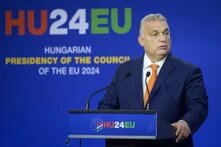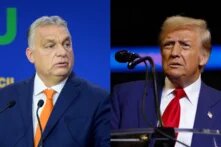Under the umbrella of the European Federation of Journalists (EFJ), thirteen journalists, press freedom, and civil society organizations are calling the EU institutes and the governments of member states to impose greater transparency on the media and their relations with political decision-makers and economic players.

EU decision-makers are in the final rounds of negotiations to agree on the recently adopted key legislation the European Media Freedom Act’s transparency guarantees. Journalist and democracy watchdogs worry the agreed text will do little good to protect journalists. Originally the Ursula von der Leyen cabinet has placed high on its agenda the defense of journalists following the infamous journalist killings in Malta, Slovakia, Bulgaria, and Denmark in 2017-18. Likewise, major media leaks like the Lux and Panama leaks resulted in repercussions against involved journalists.
The EC’s 2020-2022 Rule of Law Report and the EU’s Media Pluralism Monitor by the Centre for Media Pluralism and Media Freedom have raised alerts about the protection of journalists, lack of transparency of media ownership, and lack of independence of media regulators in a number of EU Member States.
Furthermore, the European Parliament’s LIBE committee’s opinion on the proposal bluntly acknowledges that the soft-law standards are not observed in various member states.
Major political promises, weak legislative wording
An adequate level of protection for journalistic sources and a clear ban on the use of spyware or surveillance technologies against journalists, media companies, their families or their professional network is therefore a prerequisite of media freedom and pluralism. –
“The aim is therefore to bring more of the already established soft-law standards to legally binding provisions throughout the Union.” - LIBE concludes.
In sharp contrast to the original aims of the legislation, the currently tabled final version journalists fear will further jeopardize pluralism, media freedom, and the protection of journalists.
For example, in the original proposal, the EP under article 21 cross-border and domestic plurality of the media in member states must be assessed before any acquisition or company merger is allowed. Lawmakers made little to cover up that this article was aimed at preventing what Hungarian prime minister Viktor Orbán allowed to happen with a merger of 470 media outlets in the KESMA group.
Now the final compromise between the EP and the European Council, according to diplomatic sources, only leaves such assessment to a “mere possibility” to member states and that the wording only call for nothing further than an “assessment of media market concentration”.
Media freedom vs. governments nosiness
What concerns the right of member states to plant spyware on journalists’ phones in the initial drafting process of the proposal, the French government along with a group of other governments insisted that this could be justifiable in cases of “national security”. However, press freedom and liberties organizations rightly argue that the states want to mainly use this option to identify sources of media leaks.
Closely associated with the Pegasus scandal - in which among other Hungarian journalists Szabolcs Panyi and András Szabó were wiretapped too - another heated debate matters the use of spyware. Rights groups argue they have no place in the body of law. While MEPs coined a phrasing according to which governments would be obliged to outline the evidence for spying on journalists.
The EJF open letter expresses concerns about the weakness of the proposal on relating to media ownership and state advertising transparency.
With a clear reference to countries like Poland and Hungary, the letter cites the “lack of regulation created an environment where the beneficial owners of media outlets and their relationships to politicians and business interests were hidden. State advertising is underregulated, creating an environment that enables the subsidization of government-friendly media in several member states and the resulting inequitable media market.”
EJF and co-signees of the open letter ”strongly support the Report of the Committee on Culture and Education of the European Parliament, which includes wider and more effective provisions regarding transparency than the original proposal of the Commission or the position of the Council. Nevertheless, a broader scope of available information about media ownership and state advertising, and general access to them, is crucial to support media freedom and pluralism, and to ensure the economic growth and stability of the internal market.”
A last key pillar of the proposed regulation relates to the use of case law in media regulations. Media freedom advocates call for safeguards that will force individual member states to ensure their media regulation complies with case law amassed at both the ECJ and the ECHR.
However, the wording of the trialogue draft agreement goes only as far as “judicial authorities would not need to refer to the case law before they made decisions” providing governments the way forward in the use of spyware.
Regarding the next legislative steps, the current rotating presidency holder Spain hopes to conclude the talks over the guarantees by the end of the year in trilogues with the EP and the EC.
Member state diversity and implementation doubts: Examining problems through the case of Hungary
Hungary, one of the most concerning cases of violations of media freedom, may also be one of the member states worst served by EMFA. A joint CEU-LSE research project examining the concerns and reactions of Hungarian journalists to EMFA suggests that journalists in Hungary understand media independence very differently than EU legislators, and are quite pessimistic about the implementation perspectives of any EU regulation, especially if elements of it rely on member state oversight.
First, we need to look at the specificities of Hungarian media freedom issues. According to Freedom House’s latest report on the freedom and access to information, Hungary is classified only as partly free, but it is important to point out, that there are large discrepancies between the levels of freedom of different aspects of media. While access to information is not restricted by either the availability of the internet or explicit censorship, the Hungarian media landscape is far from balanced. Serious concerns were raised both about potential biases in regulatory authorities of the media, and the almost unprecedented concentration of market-based pro-government media under a single publisher.
Hungary is often classified as an informational autocracy in the academic literature, meaning the government created an uneven playing field in delivering information to citizens but is not largely restrictive or oppressive towards remaining independent actors in the media market. Journalists are not in danger of imprisonment or violence, but independent outlets are financially uncompetitive compared to their pro-government counterparts and have less reach to shape public discourse due to the systematic dominance of governmental communication narratives. This results in a large segment of the Hungarian population, especially lower educated and ruler voters not being exposed to differential narratives in the media.
The main problem is, that EMFA is not tailored to informational autocracies, and tackling systematic causes of media freedom issues. Instead, it provides solutions (that have debatable effectiveness in the first place) for functioning democracies aiming to address shortcomings in their media freedom. EMFA, especially in its current, negotiated, or arguably even watered-down form relies strongly on the willingness of EU member states to enforce and implement regulations in good faith (which Hungary does not have a strong track record of).
On paper, it is difficult to prove that the Hungarian media landscape is any different from independent media environments in the EU. On a national level, independent, or according to pro-government narratives “opposition” of “left-wing” media does exist and is free to produce and distribute content. On an outlet level, it is even more difficult to spot any level of potential political intervention and compromises of editorial integrity, as this does not happen in formalised structures, but through informal pressures, that are difficult to detect. This brings us back to the recently conducted LSE-CEU project, where researchers asked Hungarian journalists about their understanding of the pressures on their work. Interviews were conducted anonymously with journalists and business executives from several major Hungarian outlets. While the data is still undergoing several layers of scientific analysis, some preliminary findings and notions from the research may shed a different light on understanding the potential role of EMFA in the context of Hungary.
First, journalists across the aisle, both from pro-government and independent outlets have two, competing, and very different understandings of what being “independent” means. Maybe unsurprisingly no journalist in the research claimed that the outlet they work for is not independent. Yet, by the standards of some, this independence is determined by a strict following of the church-and-state rules at an outlet, or, the absolute separation of journalistic work and business decisions. Others find independence from the government, and not belonging to the group of outlets widely referred to as “pro-government” as a defining feature of independence. While some bigger independent outlets find both equally necessary, for others, one of the two ‘independences’ is allocated more importance or weight in the journalists’ self-reflection.
Journalists have little illusions
For small, independent outlets, that work in alternative formats (as charities, NGOs etc.) due to the unusual funding landscape of the media market in Hungary, church-and-state rules are secondary. Many smaller and alternatively funded outlets rely largely on reader donations compared to advertisement revenue and often do not have separate “business” personnel, journalists are also responsible for the financial management of the outlet. Thus, in the case of these outlets, a strong separation of financial and journalistic decisions is not applicable. Most working at such outlets felt that these alternative funding profiles not only did not harm their journalistic integrity, but they contributed to them being able to remain entirely independent from government pressure.
More interestingly, outlets classified as pro-government insisted, that church-and-state principles are utmost reflected at their workplace, journalists are independent and write about what they want. On the other hand, journalists from these, as well as some independent outlets often admitted to being very aware of the expectations of both their publisher, their advertisers (including the government where applicable) and the market, and tailor, or chose not to publish content to hold up to such expectations. The tricky issue here is, that a reasonable level of self-moderation, such as catering to reader demand instead of the journalist’ own preference, or keeping in mind the profile of a media product when selecting topics is not inherently alien to a free and well-functioning press. But a high extent and high level of incentives to practice such self-censorship does distraught a media environment, which may be responsible for the uneven balance of content we observe in the Hungarian media market.
So, can EMFA help here? According to the journalists, not really. While some welcome some regulations on big tech providers, such as Google or Facebook, no journalist in the data expected a well-functioning adaptation of EMFA in the Hungarian context. First, there is no trust, that the Hungarian government will implement and enforce the regulation in any meaningful way. Second, many find that the core of the Hungarian issue is the unbalanced market itself. While EMFA (again, properly enforced) can reduce some of the favouritism in government advertising currently present, it is not a systematic solution to the funding discrepancies on the market. Therefore, many journalists instead favoured the creation of EU funds supporting independent journalism, that outlets can directly apply for. Even the small amount of currently existing schemes do provide the backbone of being able to maintain outlets and journalistic departments in Hungary. Therefore, while establishing principles and rules of media independence is a step in the right direction, in the Hungarian case, what is lacking is the means for an outlet to be able to sustain itself as an independent actor.
Disclaimer: Kata Moravecz is a researcher affiliated with the Central European University and the above mentioned research project. The authors are journalists running Eurologus.eu
This article first appeared here: cz.boell.org


